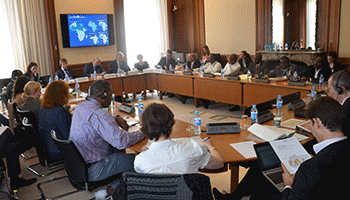SWAC/DAC Seminar on “Effective development co-operation in the Sahara-Sahel”
 |
OECD headquarters, Paris, 16 June 2014Members and partners of the SWAC's Strategy and Policy Group (SPG) and the OECD Development Assistance Committee (DAC) participated in a seminar on how to tackle regional security challenges in the Sahara-Sahel. This informal seminar raised awareness of the complex security and development issues that affect the region and of the responses that are currently being considered. The seminar provided an overview of the regional dimension of the current security issues, with a special focus on trafficking. It then analysed how existing OECD guidelines, designed to work effectively in situations of transition, can inform collective action within countries and across the region. The SWAC Secretariat underlined the importance of moving beyond a country-specific approach in order to address the regional dimension of security challenges. The seminar was jointly organised by the SWAC and DAC Secretariats. |
 |
|
Background
The complexity of the current trans-national threats plaguing the Sahara-Sahelian region were epitomised in the 2012-13 crisis in Northern Mali. The difficulty of fostering development and enacting government authority across vast and sparsely populated areas, in weak institutional contexts, is characteristic of the Sahara-Sahelian region in general. Insecurity and conflict hinder human and economic development, and the vicious circle of poverty and conflict, in the context of fragile states, leaves development opportunities untapped.
The region is one of constant transformation, in answer to the intensification and diversification of commercial and social exchanges, and strong urbanisation. Nomadic groups that traditionally inhabit and circulate in the zone are tending towards sedentary lifestyles and a diversification of economic activities. Historic social networks remain strong. They organise trade and more recently, trafficking, along trans-Saharan routes and demand centres.
Over centuries trans-Saharan trade was dominated by gold, salt and slaves. In the post-independence period, social and trading networks exploited opportunities created by national borders and public policies (import restrictions, subsidies and non-convertibility of currencies). More recently, trafficking of arms, drugs, petrol and subsidised food products has transposed itself on to these transnational networks, embodying the complexity of the challenges faced by the West-Africa region. On the one hand, trafficking can offer significant economic and social mobility opportunities for local populations. On the other hand, it leads to loss of fiscal revenues, funds terrorist activity, and discourages the flow of legitimate currency, whether from investment or tourism.
Recent developments in the area have led to a formidable mobilisation of the regional and international community in favour of the stabilisation of the Sahara-Sahelian region. Despite this unprecedented level of attention, gaps and insufficiencies continue to undermine the effectiveness of the action.
Key messages
The seminar concluded with the following key messages:
- Global threats demand concerted global action. When faced with global threats, the international community must work together towards their resolution. The DAC and its international guidelines for action provide precisely this type of forum.
- Transnational causes and effects matter. Within the context of concerted global action, transnational causes and effects need to be factored into decisions, as illustrated by the international engagement in Mali which may have displaced the spoilers into neighbouring countries.
- National solutions are undermined by mobile threats. Current mechanisms are not adapted to tackling existing challenges in the Sahara-Sahel: the challenges are characterised by mobility, but responses are mostly territorial.
- Trafficking is a more deeply rooted than terrorism. It heavily impedes the development of the region.
- Existing guidelines help operate in fragile contexts. There is a need for programmes and strategies in the region to contribute to addressing the causes and consequences of conflict at both national and regional level. A first step would be to look at how these programmes and strategies address the Peace- and State-building Goals outlined in the New Deal for fragile states.
- Innovative and flexible funding mechanisms are needed. The resolution of the current challenges of the Sahara-Sahel requires new and more flexible mechanisms to fund peace and security.
- Policy dialogue is critical. Politics must be put at the centre of enhanced partnerships between regional actors and development partners; support to inclusive political dialogue and conflict settlement should be prioritised by development partners.
- The responsibility is shared. There is a shared responsibility to promote more inclusive and frequent dialogue towards the resolution of the current challenges in the Sahara-Sahel; in particular, the DAC could foment dialogue with regional organisations that hold a key role.
Presentations
- Regional security challenges in the Sahara-Sahel, by Marie Trémolières, Senior Policy Analyst, SWAC Secretariat (French)
- Trafficking, by Alain Antil, Researcher and Head of Sub-Saharan Africa programme, IFRI
- The OECD guidance and how it applies to the regional context, by Donata Garrasi, Lead Adviser – Peacebuilding, DCD
OECD guidance tools
- The New Deal for engagement in fragile states
- Fragile states 2014: domestic revenue mobilisation
- OECD due diligence guidance for responsible supply chains of minerals from conflict-affected and high-risk areas, 2013
- Supporting statebuilding in situations of conflict and fragility, Policy Brief, June 2011
- Transition financing: building a better response, 2010
Further reading
- Addressing fragility and building resilience in Africa: The African Development Bank Group Strategy 2014–2019, June 2014
- Conflict over Resources and Terrorism: Two Facets of Insecurity, OECD West African Studies, April 2013
- Global Security Risks and West Africa: Development Challenges, OECD West African Studies, January 2012
- Controlling trafficking or losing the North : notes on trafficking in Mauritania; The Maghreb in its regional and international environment, by Alain Antil, IFRI
Useful links
- SWAC work on promoting dialogue on the security-development nexus
- International Network on Conflict and Fragility (INCAF)
- The New Deal for engagement in fragile states
- 2013-14 West African Futures: The Sahara-Sahelian areas
Related Documents

